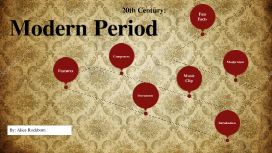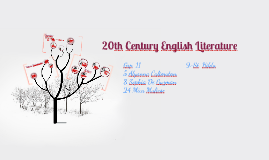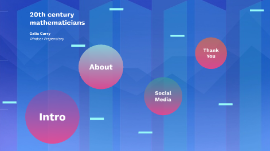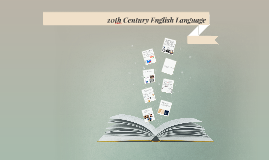20th Century Presentation
Transcript: 20th Century: Modern Period By: Alice Rockborn Introduction What is 20th Century music? The 20th century brought big changes to music as composers and performers tried new things and moved away from traditional ways. Classical music changed a lot, with new and modern styles like atonality and electronic music. Jazz also grew and became more expressive. Pop music styles like rock and electronic dance music became popular too. All these changes made the 20th century an exciting time for music. Instruments Instrumets used: In the 20th century, there were many different musical instruments used, such as the piano, violin, guitar, and drums, among others. The development and use of various instruments were influenced by different factors. These include the growth of technology, cultural exchange and experimentation, modernization of classical music, and mass production, which made instruments more affordable and available to more people. Some instruments were even created, like the electric guitar and synthesizer. All these factors contributed to a diversity of sounds and genres in the twentieth century. Features Features Used: Modernism in music embraced new approaches and abandoned traditional forms. Minimalism stripped away complexity and focused on repetition and simple patterns. It influenced American art music as well as post-rock and electronic music. Impressionism emphasized tone and atmosphere over melody and harmony, and this influenced avant-garde, electronic, and experimental music. Neo-classicism emerged as a reaction to the excesses of the Romantic era in classical music, seeking to return to the formal clarity and order of the Classical era. Its principles were incorporated into the music of many composers and helped to revive interest in Classical aesthetics. Composers Composers Igor Stravinsky - Russian/French composer known for his neo-classical and serialist compositions Arnold Schoenberg - Austrian composer and pioneer of atonal music and the twelve-tone technique Claude Debussy - French composer associated with impressionism George Gershwin - American composer known for his popular Broadway shows and blending of jazz and classical styles Aaron Copland - American composer known for his incorporation of American folk themes into his works Benjamin Britten - English composer and pacifist known for his operas and vocal works Sergei Prokofiev - Russian composer known for his innovative orchestration and integration of folk music into his compositions Béla Bartók - Hungarian composer known for his use of folk elements and his contributions to ethnomusicology Dmitri Shostakovich - Russian composer known for his symphonies and operas that often depicted Soviet life John Cage - American composer known for his avant-garde and experimental compositions, including pieces that incorporated silence and chance elements. Music Clip Modernism Modernism Modernism refers to a cultural movement that emerged in the late 19th and early 20th century, which embraced new ideas, techniques, and modes of expression in art, literature, music, and other fields. In music, modernism involved breaking away from traditional forms and methods of composition and adopting new approaches and styles that reflected the rapidly changing cultural and social landscape of the time. These new musical styles were often characterized by experimentation, innovation, and a rejection of conventional musical structures and forms. Fun Facts Fun Facts Elvis Presley's first single, "That's All Right," was recorded in 1954 and is considered by many to be one of the first rock and roll songs. The Beatles' 1967 album Sgt. Pepper's Lonely Hearts Club Band was a groundbreaking album that ushered in the era of concept albums and transformed the world of popular music. The 20th century saw the rise of many iconic musicians such as Louis Armstrong, Frank Sinatra, Bob Dylan, Michael Jackson, Madonna, and Beyoncé. "Stairway to Heaven" by Led Zeppelin is widely considered to be one of the greatest rock songs of all time. The 20th century also saw the emergence of various music festivals, such as Woodstock and Coachella, which have become iconic events in the music calendar. The synthesizer, a key instrument in electronic music, was invented in the 20th century by Robert Moog. The musical "Hair," which debuted in 1967, was one of the first musicals to incorporate rock music and address social issues such as race and sexuality. The iconic US TV show "The Ed Sullivan Show" introduced many famous musical acts, including The Beatles, Elvis Presley, and The Rolling Stones, to American audiences. The famous DJ and producer, David Guetta, is credited with popularizing the genre of electronic dance music (EDM) in the late 20th and early 21st centuries. The 20th century was a time of great musical innovation, with new and experimental genres of music, such as punk, hip-hop, and grunge, emerging and shaping the sounds of modern music.

















